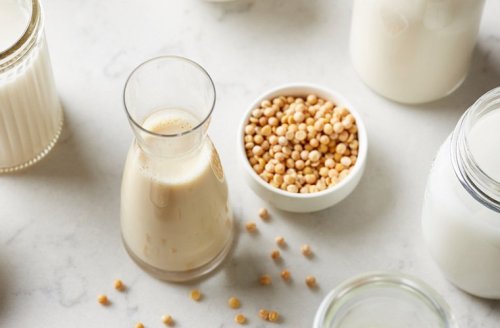FDA admits that no, soy protein probably won’t help you fight heart disease
The FDA submitted a proposal to revoke the health claim that soy protein fights heart disease because there's not enough evidence.

While some people depend on soy as a dairy-free or meat alternative, research and medical professionals—including integrative medicine expert Frank Lipman, MD—warn against the straight-up harmful effects of its products. And the ingredient isn’t limited to just tofu and soy—it’s also in 60 percent of processed food (which is largely why Blake Lively cut it from her diet), where it’s broken down into other typically unhealthy forms. But, despite soy disrupting thyroid and endocrine function and gifting you some gnarly effects like fatigue and constipation, the US Food and Drug Administration (FDA) claimed it was a great way to reduce the risk of heart disease—until now.
In 1999, the FDA authorized soy protein purveyors to dub the products as effective in preventing the disease, but this week a proposal was submitted to revoke that health claim, as the agency admits supporting evidence is severly lacking.
“Our review of that evidence has led us to conclude that the relationship between soy protein and heart disease does not meet the rigorous standard for an FDA-authorized health claim.” —Dr. Susan Mayne, director of the FDA’s Center for Food Safety and Applied Nutrition
“Our review of that evidence has led us to conclude that the relationship between soy protein and heart disease does not meet the rigorous standard for an FDA-authorized health claim,” Susan Mayne, PhD, director of the FDA’s Center for Food Safety and Applied Nutrition, said in a statement.
But, the FDA’s proposal doesn’t mean the rule is revoked quite yet: For the next 75 days, stakeholders—and anyone else who’s interested—can submit comments on the matter. That means there’s still a chance soy protein reducing heart-disease risk could remain one of the FDA’s 12 authorized health claims—one of which, for example, is that certain fruits and veggies can decrease the risk of cancer.
Despite concerns about potential health limitations (and even detriments), if you need a soy fix, even Dr. Lipman admits the stuff won’t kill you outright. And according to the Cleveland Clinic, soy is naturally cholesterol-free, low in saturated fat, rich in omega-3s, full of vitamins, minerals, and phytochemicals, and can help boost your protein and fiber intake.
Whatever the future holds for heart-health claims on soy-protein products, the confusion alone might be reason enough to try and find other alternatives, like nut milk and healthier sources of plant-based protein.
Find out which type of milk is best for *you*. Also, these are the healthy foods wellness pros stock up on at home.
Sign Up for Our Daily Newsletter
Get all the latest in wellness, trends, food, fitness, beauty, and more delivered right to your inbox.
Got it, you've been added to our email list.










